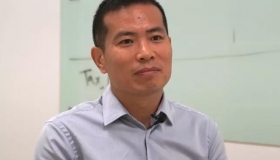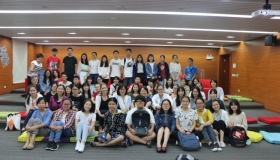Dream Pursuer: A University President Determined to Blaze a Trail
“What are your hobbies? What’s your plan for the weekend? Who’s your favorite author?” the students circle around him, asking in English.
This is commonplace on campus. In the eyes of the students, Mr. Xu is their “Most Endeared President” as they frequently see him at the canteen, the English club or on campus trails.
From a school lad to a scholar
“I am destined to have a rootless life.” Mr. Xu often comforts himself.
At 15, he was dispatched to countryside to receive reeducation. Farmers thought him of as a flamboyant dandy while city dwellers regarded him as a country pumpkin; in Hong Kong, he is a mainlander while in the mainland, he is a Hongkonger. “The dual status provides a certain edge in that I can bring both sides closer.” Laughed Mr. Xu.
In the 50s, He was born to a family of scholars in Shaoxing, Zhejiang province. After high school, he was sent to countryside to “learn from the peasantry” for two years. In 1977 when the college entrance examinations were reintroduced, he seized the opportunity and enrolled himself. “I just wanted to go to school. I didn’t care which one.” One month later, he found his name on the list of successful applicants. He was admitted to Zhenjiang University, his dream school.
Seven years later, he went to the US to study and obtained a Ph.D. degree. Then he taught at Carnegie Mellon University and engaged in robotics research. But his course of life took a sharp turn when he forsook everything in the US, packed up and came back to The Chinese University of Hong Kong at the acme of his career. “All of my friends opposed my decision and they thought I lost my mind.”
But Mr. Xu had his reasons. Hong Kong looked irresistible with its multiculturalism. “I am Chinese and Chinese culture is in my blood and veins. Meanwhile, I understand western culture and western technologies. So I followed my heart and returned to Hong Kong.” said he. On the handover day, Mr. Xu walked to the venue despite heavy rainfalls, excited and blissful. “It means a lot to me to work in this global metropolitan and to contribute to the wellbeing of the nation.”
Later, Mr. Xu crossed the shallow border river, came to Shenzhen and decided to run a school. He is a staunch idealist to his colleagues and friends.
Staff members of CUHK (SZ) told me that on every strategic development forum at each semester, Mr. Xu would reiterate the school’s founding philosophy. “Our objective is to nurture students with Chinese traditional culture and international perspective. We cultivate leadership not servitude; we produce global talent with bilingual skills to satisfy the social and economic needs of China.”
An “other” international university
“Running an international university with Chinese culture”. This idea has lingered on his mind for many years.
In the 20s and 30s, students of Mr. Xu’s alma mater Zhejiang University rode horse-drawn carts to school and attended class in thatched sheds, as wars raged on and conditions were adverse. However, Zhejiang University was called “Oriental Cambridge” and ranked 3rd place in Asian University Rankings. This has made Mr. Xu to contemplate why China doesn’t have any world class university even conditions are much better than in the 20s or 30s.
During a short respite from the interview, he told me a story about the origin of the Department of Asian Languages and Cultures of Columbia University. More than 100 years ago, Mr. Ding Long, a laborer from Canton, worked as a valet in an American family. His personal qualities and love of learning moved his master General Carpentier. To disseminate Chinese culture and promote sinology, General Carpentier made a donation to Columbia University in the name of Ding Long and set up the Department of East Asian Studies. “Mr. Ding Long was not a learned man, but he possessed Chinese moral values and personal qualities, which urged General Carpenter to donate.” On many occasions, Mr. Xu called on the public to “have confidence in our own culture.”
Mr. Xu is a man of his word. “We open Liberal Arts Colloquium, Chinese Cultural Colloquium and general education courses to help our students to appreciate the beauty of Chinese traditional culture.”
His tenacious hold to his dream has affected those like-minded. In response to his call, many renowned professors have come to his school to share his ambition, leaving their beloved ones behind.
Making Dream Come True
Mr. Xu is super busy. He spares no effort in making his dream come true.
One staff member comments, “We come to office at 8:30 am, but the President starts work at 7:00 am.” Mr. Xu’s daily schedule runs like this: at 6:00 am, he climbs a hill right beside the school, then comes back to office. He seldom engages in social activities unless they are related to running the school. Even when he attends such events, he would come back to office to reply to emails or walk around the campus, musing on how to improve students’ study experience. He even moved his family over from Hong Kong.
His school is a Sino-foreign cooperative university and he has chosen Longgang district as the school’s birthplace. As this type of school is a quite new concept, people always ask him: “How can you guarantee that teaching quality and academic level are tantamount to or even better than CUHK?” Mr. Xu would then patiently explain that CUHK actually monitors and controls every step this school takes in designing disciplines, engaging deans or determining instruction methods. The school adopts a system of President’s accountability under the supervision of the Governing Board. The Chairman of the Board is the President of CUHK and qualified students will be conferred CUHK degrees.
Mr. Xu once said that the programmes at CUHK (SZ) is are able to fit the needs of social and economic development of the Pearl River Delta region for the next 10 or 20 years. This journalist did not comprehend the confidence behind this bold and ambitious statement until the end of the interview. It turns out that Mr. Xu has conducted massive and meticulous researches and investigations in terms of the programmes of outstanding universities in Mainland China (particularly the Pearl River Delta region), Hong Kong, Singapore and the USA. “For instance, Shenzhen is to become an international financial center and that entails at least 3,000 global talents; another case in point is biomedical engineering. Shenzhen is the second key city in this area; the can also be said true of new energy and genetics……” said Mr. Xu.
Omnipresent “President”
Ying Yue, a sophomore student, told me that in the second week after the new term began, President Xu invited the undergraduate students to dinner and had a roundtable discussion. Unlike any other university in Mainland China, students at this university often encounter their President in the canteen and he would sit down and chat with them.
Students also receive his invitation. Ying Yue recalled that Mr. Xu once asked them to climb the hill and play badminton. “He strikes me as pleasant, humorous and insightful. He is genuine to us and we feel no generation gap around him. He remembered my English name in the first class and can address us by our names whenever we meet him on campus.” Furthermore, Mr. Xu has set up “President Mailbox” and “Good Idea Mailbox” to solicit questions and suggestions from the public, staff members and students.
When telling us about robots and an intelligent manufacturing lab, Dr. Huihuan Qian, another student of Mr. Xu, credited all his achievements to an axiom that Mr. Xu quoted: Only the strong-willed can achieve high intelligence.
Other than robotics research, Mr. Xu loves painting, calligraphy and sports. “Many creative ideas just pop into my mind when I climb the hill with my students.” He smiled.
Source: Shenzhen Overseas Chinese News




